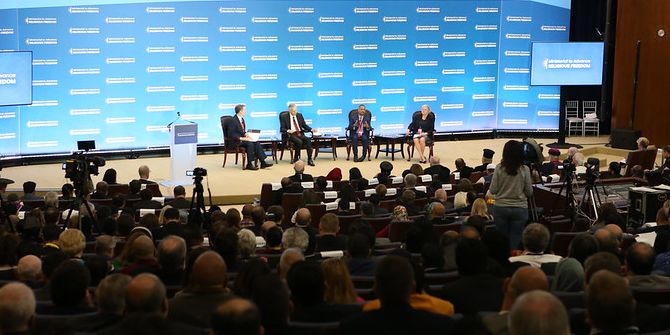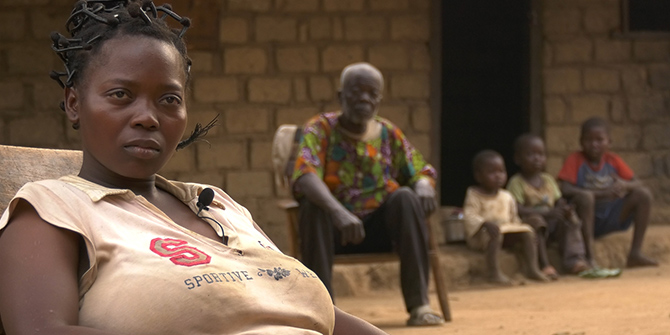In the United States, religious freedom has in recent years received greater attention as a foreign policy priority. Central to this is the work of the US Commission on International Religious Freedom. Tina L. Mufford outlines the remit of this independent, bipartisan body. She offers some insight into how USCIRF compiles its major annual report by working with a diverse range of partners around the world. She also mentions the encouraging emergence of state-level initiatives in other countries that are working to promote international religious freedom.

The universal right to freedom of religion or belief is as much in peril today as it has ever been. Around the world, people of all faiths – as well as atheists, agnostics, and humanists – suffer for their beliefs and for living as their conscience leads. No matter the perpetrator, denying or restricting the right to freedom of religion or belief violates international human rights standards and the innate right we all have to think and believe as we choose. The global policy response has not kept pace with the scope and severity of violations.
In part, this is why the U.S. Commission on International Religious Freedom, or USCIRF, was created by the U.S. Congress more than 20 years ago. The International Religious Freedom Act of 1998 (IRFA, as amended), set out to elevate religious freedom as a higher priority in U.S. foreign policy, providing mechanisms to condemn violators (e.g. through sanctions) and to encourage governments to protect this right. As an independent, bipartisan U.S. federal government advisory body, USCIRF is tasked “to independently assess and to accurately and unflinchingly describe threats to religious freedom around the world,” and to advise the U.S. government.
One of USCIRF’s primary duties under IRFA is to issue an annual report setting forth policy recommendations to the U.S. government. USCIRF’s 2019 Annual Report covers 28 countries, those which are considered to be among the worst in the world for religious freedom. Each country has its own chapter with key findings, an overview of religious freedom conditions from the 2018 calendar year, and an analysis of and recommendations for the U.S. government. The report—and our work in general—is informed by USCIRF’s meetings, independent research, and travel.
The countries in the annual report fall into two categories, or tiers. Tier 1 refers to countries whose government engages in or tolerates particularly severe religious freedom violations, defined by IRFA as those that are systematic, ongoing, and egregious. IRFA directs the U.S. Department of State to designate any countries that meet this standard as “countries of particular concern,” or CPCs, and take commensurate action in response. In 2019, USCIRF recommended 16 countries be designated as CPCs: Burma, Central African Republic, China, Eritrea, Iran, Nigeria, North Korea, Pakistan, Russia, Saudi Arabia, Sudan, Syria, Tajikistan, Turkmenistan, Uzbekistan, and Vietnam.
Tier 2 is defined by USCIRF as countries whose governments engage in or tolerate at least one element of the systematic, ongoing, egregious CPC standard. In 2019, USCIRF categorized 12 countries as Tier 2s: Afghanistan, Azerbaijan, Bahrain, Cuba, Egypt, India, Indonesia, Iraq, Kazakhstan, Laos, Malaysia, and Turkey.
Of all the countries where freedom of religion or belief is denied or restricted, China epitomizes the human toll these violations exact on believers and nonbelievers. Any calling to an authority other than the state is often met with harassment or intimidation, pervasive monitoring in public and at houses of worship, physical destruction of religious property, arrest without warrant, indefinite detention without charge or trial, extrajudicial force, and, in some cases, even torture or death. Whether Tibetan Buddhist, Christian, or Falun Gong, the Chinese government suppresses them all, trying to subject citizens to state-approved versions of religion that demand loyalty to the Chinese Communist Party above all else.
The Chinese government’s deplorable and dehumanizing treatment of religious followers prompted USCIRF to feature the plight of Uighur Muslims in China on the cover of our 2019 Annual Report. Chinese authorities have detained up to two million Uighur and other Muslims without charge in internment camps, claiming that the so-called vocational training detainees receive erases their “extremist” thoughts. They are forced into rote learning of the Chinese language (not their native tongue) and devotional recitations about the Communist Party. Meanwhile, those not yet in the camps face constant surveillance in a virtual police state, and authorities prevent them from attending mosque, prohibit “Islamic” baby names, ban fasting during Ramadan, and have deemed the wearing of beards and veils as extremist. At the zenith of this invasive behavior, authorities pay regular visits to Uighur homes, sleeping in the same beds as Uighur families for days at a time.
China is only one of many examples around the world where the fundamental right to freedom of religion or belief is under grave threat. Nevertheless, these abuses increasingly are emerging from the shadows as more advocates than ever before shine a light on these violations. USCIRF has long worked with many of these brave individuals and organizations, whether religious leaders, civil society, regional and international bodies, and sometimes foreign governments.
In practical terms, this plays out in several ways. Throughout the year, USCIRF Commissioners and staff meet with and receive information from both U.S.-based and overseas interlocutors, some of whom are human rights defenders, nongovernmental organizations, academics, and the religious communities impacted by religious freedom violations. The Commission amplifies this data with its own independent research and sometimes specific contracted research. This combined information—once reasonably verified and confirmed through trusted sources—informs USCIRF’s annual reports, but also a wide variety of other interventions and products.
While the U.S. government is USCIRF’s primary audience under IRFA, advocacy on behalf of certain individuals, religious communities, or about crosscutting thematic issues like blasphemy is an important tool through which to influence policymakers and wider audiences. One example of this is USCIRF’s Religious Prisoners of Conscience Project wherein Commissioners adopt a religious prisoner of conscience—someone imprisoned, detained, under house arrest, or disappeared for their religious beliefs or religious freedom advocacy—to help put a human face on the kinds of religious freedom violations occurring in the world and expose the governments and nonstate actors who perpetrate them.
Also, USCIRF receives regular updates while attending the International Religious Freedom Roundtable, a network of mostly Washington, DC-based nongovernmental organizations “from any and no faith that work for freedom of religion or belief.” Since last year’s first-ever Ministerial to Advance Religious Freedom hosted by the U.S. Department of State, advocates have launched similar roundtables—for example, in Nigeria and Taiwan—and some countries have even established their own ambassadors-level positions on religious freedom, like the United Kingdom, Germany, Mongolia, Bahrain, Taiwan, in addition to similar existing positions in the United States, Norway, Denmark, and the European Union.
USCIRF endeavors to engage the U.S. government and other key stakeholders. The Commission collects as much information from as many sources as possible, including foreign governments. The key is weeding through the rhetorical propaganda to get to the truth, perhaps finding a leverage point along the way that may become one of USCIRF recommendations to the U.S. government. USCIRF—and others in this line of work—is only as credible as the accuracy of information documented in its reports.
There are innumerable reasons to be cynical about the state of religious freedom in the world today. One need only look at countries like Syria, Russia, Burma, Iran, Tajikistan, or Nigeria to feel overwhelmed at the scope and severity of violations occurring at this very moment. Yet increasing numbers are willing to speak out on behalf of other faiths. It is inspiring to see the powerful and profound images of Buddhists supporting Muslims, Christians supporting Bahai’s, atheists supporting people of faith, and vice versa. Our voices are stronger when we stand up for one another, and the policy response needs to answer this same clarion call.
Note: USCIRF’s 2019 Annual Report can be accessed here.
Note: This article is part of our ‘Real-World Approaches: Freedom of Religion or Belief‘ series
Note: This piece gives the views of the author, and not the position of the LSE Religion and Global Society blog, nor of the London School of Economics.






1 Comments